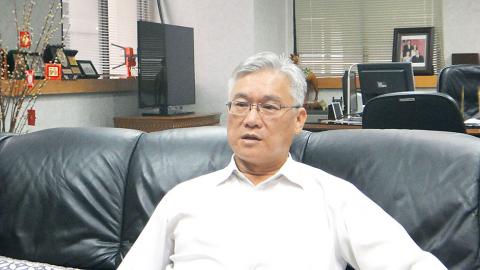Representative to Indonesia Andrew Hsia (夏立言) yesterday was named deputy minister of the Ministry of National Defense in charge of policy, drawing mix reactions from lawmakers.
At a question-and-answer session in the legislature, Premier Jiang Yi-hua (江宜樺) said that Hsia would be tasked with overseeing arms procurement policies, a position that has been vacant for about two months.
The position was left vacant on Aug. 1 when former vice minister of national defense Andrew Yang (楊念祖) was promoted after former minister of national defense Kao Hua-chu (高華柱) resigned over public outrage at the death of army corporal Hung Chung-chiu (洪仲丘), who died from alleged abuse. Yang resigned from his new post days later.

Photo: CNA
Chinese Nationalist Party (KMT) Legislator Chen Ken-te (陳根德) questioned Hsia’s qualifications for the job because of the “lack of professionalism” in defense-related affairs he showed as he fielded questions during the session.
Jiang said that the appointment was made after consultations with President Ma Ying-jeou (馬英九), the Ministry of Foreign Affairs and the defense ministry.
Hsia has the expertise required for the position, which is similar to his predecessor’s, Jiang said.
Minister of National Defense Yen Ming (嚴明), who succeeded Yang, said he welcomed having more experienced diplomats in the ministry.
According to the Executive Yuan, Hsia will be the third civilian deputy defense minister under the Ma administration since May 2008, following Yang and Representative to Israel Chang Liang-jen (張良任).
KMT Legislator Lin Yu-fang (林郁方) praised the appointment.
Hsia, previously stationed in New York, is fluent in English and experienced in dealing with the US government, while also possessing a broad knowledge of international politics, which qualifies him to be a deputy defense minister, the key person who communicates with the US about arms procurement policies, Lin said.
Democratic Progressive Party Legislator Hsiao Bi-khim (蕭美琴) said the appointment was “illogical” because Hsia lacked experience in handling defense-related affairs and was not well-acquainted with such issues.
There is no comparison between Yang and Hsia because Yang specialized in military strategy before he entered the ministry, Hsiao said.
Hsia resigned as deputy minister of foreign affairs in August 2009 after a cable sent by the Ministry of Foreign Affairs instructing foreign missions to decline all forms of foreign aid in the aftermath of Typhoon Morakot was disclosed by a newspaper, sparking a public backlash.
Elsewhere, Vice Minister of Education Chen Te-hua (陳德華) is to succeed Deputy Minister of Education Chen Yi-hsing (陳益興), while Council of Indigenous Peoples Chief Secretary Chen Cheng-chia (陳成家) was appointed deputy minister of the council, the Executive Yuan said in a statement.

Alain Robert, known as the "French Spider-Man," praised Alex Honnold as exceptionally well-prepared after the US climber completed a free solo ascent of Taipei 101 yesterday. Robert said Honnold's ascent of the 508m-tall skyscraper in just more than one-and-a-half hours without using safety ropes or equipment was a remarkable achievement. "This is my life," he said in an interview conducted in French, adding that he liked the feeling of being "on the edge of danger." The 63-year-old Frenchman climbed Taipei 101 using ropes in December 2004, taking about four hours to reach the top. On a one-to-10 scale of difficulty, Robert said Taipei 101

A preclearance service to facilitate entry for people traveling to select airports in Japan would be available from Thursday next week to Feb. 25 at Taiwan Taoyuan International Airport, Taoyuan International Airport Corp (TIAC) said on Tuesday. The service was first made available to Taiwanese travelers throughout the winter vacation of 2024 and during the Lunar New Year holiday. In addition to flights to the Japanese cities of Hakodate, Asahikawa, Akita, Sendai, Niigata, Okayama, Takamatsu, Kumamoto and Kagoshima, the service would be available to travelers to Kobe and Oita. The service can be accessed by passengers of 15 flight routes operated by

Taiwanese and US defense groups are collaborating to introduce deployable, semi-autonomous manufacturing systems for drones and components in a boost to the nation’s supply chain resilience. Taiwan’s G-Tech Optroelectronics Corp subsidiary GTOC and the US’ Aerkomm Inc on Friday announced an agreement with fellow US-based Firestorm Lab to adopt the latter’s xCell, a technology featuring 3D printers fitted in 6.1m container units. The systems enable aerial platforms and parts to be produced in high volumes from dispersed nodes capable of rapid redeployment, to minimize the risk of enemy strikes and to meet field requirements, they said. Firestorm chief technology officer Ian Muceus said

MORE FALL: An investigation into one of Xi’s key cronies, part of a broader ‘anti-corruption’ drive, indicates that he might have a deep distrust in the military, an expert said China’s latest military purge underscores systemic risks in its shift from collective leadership to sole rule under Chinese President Xi Jinping (習近平), and could disrupt its chain of command and military capabilities, a national security official said yesterday. If decisionmaking within the Chinese Communist Party has become “irrational” under one-man rule, the Taiwan Strait and the regional situation must be approached with extreme caution, given unforeseen risks, they added. The anonymous official made the remarks as China’s Central Military Commission Vice Chairman Zhang Youxia (張又俠) and Joint Staff Department Chief of Staff Liu Zhenli (劉振立) were reportedly being investigated for suspected “serious